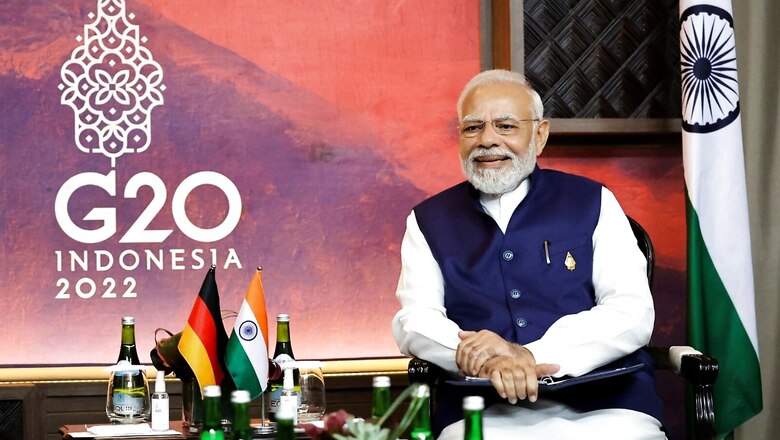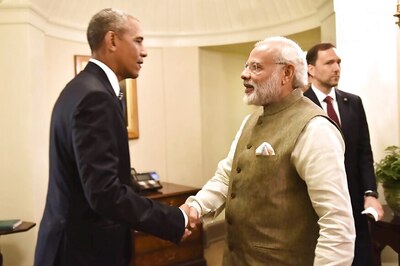
views
We have high ambitions to make the best for ourselves as G20 president. We are treating our presidency not simply as a responsibility that devolves on a country rotationally, but as an opportunity we must not miss leaving our mark on all the pathways to address the key issues confronting the international community.
At the centre of it all is the raison d’ètre of G20, which is that of coordination of policies by the major economies to ensure global economic growth and financial stability. This will be a difficult challenge in view of anti-globalisation trends, the weakening of the WTO and the “nation-first” strategies now being prioritised by countries like the United States. Its Inflation Reduction Act, for instance, which will subsidise its green energy industry, is causing serious concerns in Europe as it risks off-shoring of European industry to the US so that it can remain competitive in view of the steep rise in energy costs in Europe following decisions to end dependence on Russia as a source of cheap energy, especially in Germany’s case. Europe is protesting and threatening to retaliate, but the US is unwilling to step back from a decision intended to re-shore US industry in an area of future industrial growth, which will also serve the climate change agenda.
New tensions like these, within the West, will affect discussions within the G20 on developing a consensus on issues that are arising as competition pressures grow from a destabilised global economy as a result of various developments such as the Covid pandemic, perceived negative consequences of globalisation reflected in the erosion of the middle class and loss of jobs at home, need for on-shoring manufacturing, reducing over-dependence on countries like China for critical raw materials and supply chains etc.
In the case of the climate change agenda, the issue of the availability of finance and technology to developing countries to enable them to make the necessary energy transitions will be a monumental challenge in view of the gargantuan sums involved, when even the $100 billion target per year is not being achieved at present. India has acquired credibility in pushing the case for developing countries in G20 discussions, given its domestic programme to switch to renewable energy and the lead it has taken internationally to set up the International Solar Alliance along with France and the Coalition for Disaster Resilient Infrastructure. The launch of Mission LiFE (Lifestyle for Environment) by Prime Minister Narendra Modi has had resonance internationally and will no doubt figure in the G20 summit document, but achieving it in any meaningful way will be a long haul as it will mean a change in the wasteful and consumerism oriented lifestyles in the developed world, which the developing world seeks to replicate too with rising incomes and prosperity.
The disruption of global supply chains caused by the Covid pandemic has been aggravated by the Ukraine conflict with consequences for the global economy and for developing countries in particular. In the critical areas of food, fertiliser and energy shortages, the developing countries are facing a dire situation, especially in sub-Saharan Africa where, in parts, the spectre of famine has been hanging because of prolonged drought conditions. India has been rightly pointing out that fertilizer shortages will adversely affect foodgrain production going ahead and aggravate what is already an alarming situation in parts of the world. This is part of India’s seeking to reflect the concerns of the Global South on international platforms, including the G20.
Energy is the lifeblood of economies everywhere, which is why a spike in oil prices is particularly damaging for energy-importing developing countries, affecting their financial and fiscal stability with inflation, indebtedness, current account deficits, lower growth, more unemployment etc. As a result, the geopolitical confrontation in Europe leading to energy sanctions on Russia, the sabotage of oil pipelines, the switch to much more expensive natural gas from the US by Europe, and the re-opening of coal-fired power plants in Germany, for instance, makes little sense to the non-Western world, especially the developing oil-importing countries, as this is adversely affecting their economic future.
The latest US-EU decision to impose a $60 price cap on Russian oil creates more uncertainty in the oil market, with Russia’s insistence that it will not sell oil to any country that accepts the cap. With the US failing in its efforts to push Saudi Arabia to raise oil production to avoid a spike in oil prices and OPEC-plus cutting production instead, and efforts of the US to bring sanctioned Venezuelan oil into the market to stabilise prices show how ad hoc steps are being taken to find solutions to the problems willfully created without adequate consideration being given to wider consequences for the international community. Saudi Arabia, being a G20 member, means that consensus-making on energy strategies to stabilise oil prices during discussions in India will be that much more challenging.
The 2030 Agenda for Sustainable Development adopted by the UN in 2015, which has 17 Sustainable Development Goals (SDGs), had already been badly impacted by the Covid pandemic with 200 million people falling below the poverty line and 100 million losing their jobs. With the fuel, fertiliser and food shortages and further disruption of supply chains caused by the Ukraine conflict, the prospects of attaining these goals have receded further. India will seek to focus on these goals during its presidency despite all the challenges that exist. Prime Minister Modi’s emphasis on human-centric globalisation reflects the priority India attaches to the realisation of these goals in a cooperative framework.
India intends to play to its strengths as G20 president by showcasing its achievements in developing digital goods for sociological transformation and poverty removal, inclusiveness and bridging the digital divide within and between countries. Its digital public infrastructure model that includes Jan Dhan, Aadhaar, UPI, CoWIN, Ayushman Bharat, Direct Benefit Transfer and the like can be replicated in developing countries to achieve development goals. India’s ideas on this subject can be expected to get reflected in the summit document.
India will no doubt press for new approaches to intellectual property and the co-development of health technology to ensure a more inclusive response to the health crisis. But as we have seen at the World Trade Organisation (WTO), the proposal by India and South Africa to waive Intellectual Property Rights (IPRs) under the TRIPS provisions on vaccines, therapeutics and diagnosis has been resisted by the West. Despite the severity of the Covid pandemic and its enormous physical and economic costs, the advanced countries are unwilling to sacrifice profits for human solidarity.
How the Ukraine conflict unfolds will of course affect the G20 discussions under India’s presidency. The outlook on any early resolution of the conflict is bleak. Russia’s President Vladimir Putin has acknowledged that it will be “a lengthy process”. The EU has just imposed the 9th round of sanctions on Russia; NATO’s proxy war against Russia through Ukraine continues. As at Bali, the West will seek to condemn Russia in G20 discussions. Hopefully, India will be able to forge agreed declarations when various meetings at finance and foreign ministers’ levels take place and, unlike in the case of Indonesia, will not have to resort to statements by the Chair. The language agreed to in the Bali summit document on Ukraine can be reproduced in the New Delhi summit document but the West will seek to update it, depending on developments. India will have to handle this as best as possible, with the positive role it played at Bali to reach a consensus gaining it negotiating space with both sides.
Regrettably, even as India seeks to increase its international profile to the nation’s advantage by using the G20 platform, the Opposition parties in India are criticising the government for using the platform for party politics with the 2024 elections in view, and behaving as if India’s presidency is an achievement when it is merely rotational. Even if the latter is true, it is what India makes of the presidency in putting its own stamp on the discussions and the final document that is important. India has laid out its agenda for the presidency in detail in public. There is absolutely nothing in it that can be linked to party politics. It is but natural if Modi as Prime Minister gains in profile as the country’s leader as a result of a successful presidency. Leaders also look for foreign policy successes for electoral reasons, just as they bear the political cost of foreign policy failures. No national interest is served by the Opposition parties creating a domestic controversy around India’s presidency.
Kanwal Sibal is a former Indian Foreign Secretary. He was India’s Ambassador to Turkey, Egypt, France and Russia. The views expressed in this article are those of the author and do not represent the stand of this publication.
Read all the Latest Opinions here



















Comments
0 comment